Young Bundy busy bees build hotels for our native pollinators
Features
Earlier this year, St Luke’s Anglican School purchased some native bees to care for and study. The flow-on effect of this initiative has been significant for Year 4 students, who share their interesting insights and learnings in this special joint feature
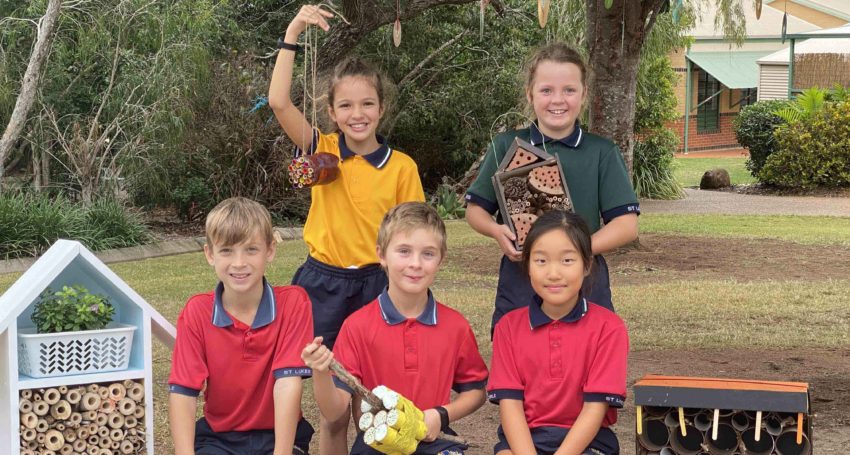
Year 4 St Luke’s Anglican College students and staff continue to be inspired by Year 4 teacher Mr Bigg (AKA, ‘Beekeeper Barry’) who has a love for Australian native stingless bees and is an avid beekeeper. Mr ‘Beekeeper Barry’ Bigg worked with the school to purchase some native bees to study and keep within the Primary School. The flow-on effect of this initiative has been significant for Year 4 students, who share their interesting and surprising insights and learnings in this special joint feature, along with teacher and Parish of Bundaberg parishioner Mrs Russo.
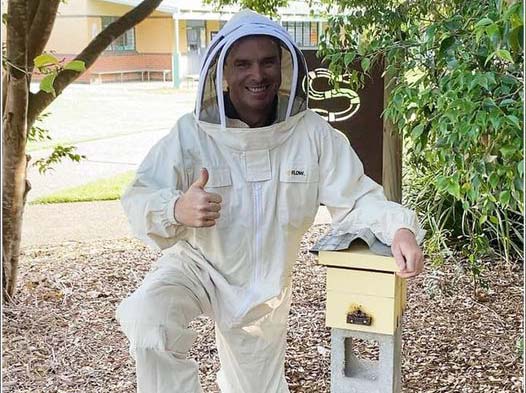
Year 4 St Luke’s Anglican School teacher Mr ‘Beekeeper Barry’ Bigg worked with the school to purchase some native bees to study and keep within the Primary School (June 2021)
Hayley Russo – Year 4 teacher, St Luke’s Anglican School
The bee unit is an integrated curriculum unit that encompasses elements of science, design and digital technologies. After studying bees and their life cycles in detail, the students are challenged to use an engineering design process to solve a particular environmental problem – in this case the destruction of bee habitats by humans.
Our students then follow a five-step process that challenges them to ask, imagine, plan, create and then improve their particular solution to this problem. The solution our students work through is the planning and construction of a solitary bee hotel.
Solitary bees play a vital role in pollinating our native flora, and they are vital in the pollination of our local agricultural crops here in Bundaberg. Students then make a prototype at home with the help of their families and bring it in to discuss with their peers.
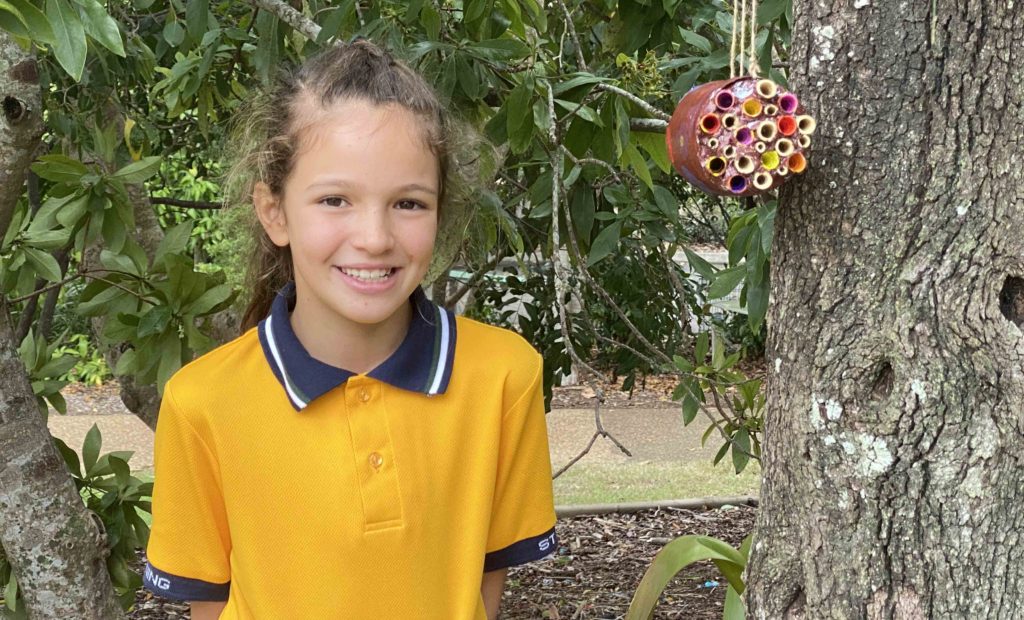
Year 4 St Luke’s Anglican College student Amelie with her bee hotel in July 2021
Amelie – Year 4 student, St Luke’s Anglican School
The most interesting thing I have learnt about bees is that the worker bees push the drone bees out of the hive when they aren’t needed anymore. The drone bees die soon after they fall out of the hive. The second most interesting thing is that the Queen bee only eats royal jelly and the drone bees can’t feed themselves.
I loved all of the bee activities, but I think the bee hotel was my favourite. It was really fun! Making it was a bit challenging but when I finished, I was proud and I loved it. My bee hotel’s base is made out of a soda bottle. I put pen lids inside as a replacement for the hexagonal cells. I painted the outside of the bottle brown with flowers so the bees feel more at home. In the end I also added sponge and bamboo to the bottle. The bamboo was used because I didn’t have enough pen lids. The sponge was so the bees didn’t get stuck at the end of the bottle.
Advertisement
Bees are important because while they go about making honey, they also accidentally make flowers grow. It all happens when bees land on flowers – they collect pollen within the flower, then when the bees take off again and land on another flower they accidentally smear some of the previous flower’s pollen onto that flower.
I recommend that other schools bring native bee hives into their schools so that they get to learn a lot more about how bees live, and eventually the bee population will get bigger and bigger. As a bonus you can learn a lot more about bees.
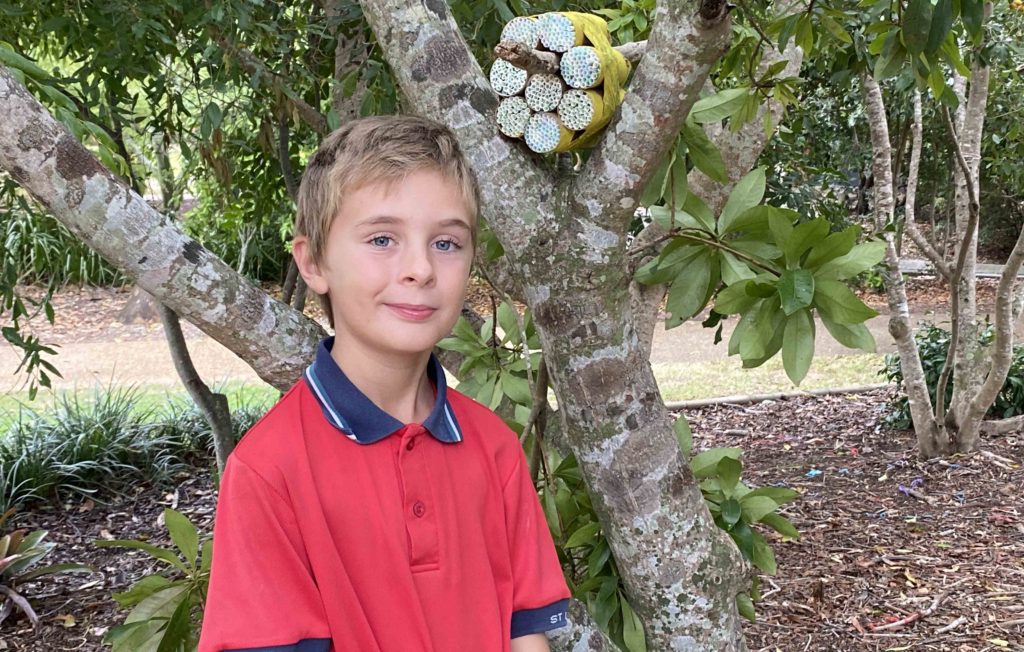
Year 4 St Luke’s Anglican College student Jared with his bee hotel in July 2021
Jared – Year 4 student, St Luke’s Anglican School
The most entertaining thing I’ve learnt is that bees cannot see red! One of the primary colours cannot be seen by bees! Another interesting fact is that when no more young are needed, the worker bees kick the drones out of the hive and leave them to die. Bees are probably the most interesting animals I’ve ever learnt about!
My favourite bee activity so far is building our bee hotels. Sure, it takes up some of your time, but you get to learn more about bees when you’re studying what they like best! You also get to help bees stay alive because your hives help keep them safe and reduce the loss of bees. Bees keep us alive, so we keep them alive.
Advertisement
Bees are important in life because without them, humankind and all animals would die in three years! A bee’s main job is to pollinate all the flowers. As they gather pollen food for the colony they mess it everywhere and it helps the flowers grow. If they help us, we should do something for them, too!
Other schools should implement a bee program so that we can see what the differences are between each other’s work! We can see how we can improve on our creations, share ideas with each other and chat about how we did it at home! Bonding with others can improve your build because they can give you awesome information.
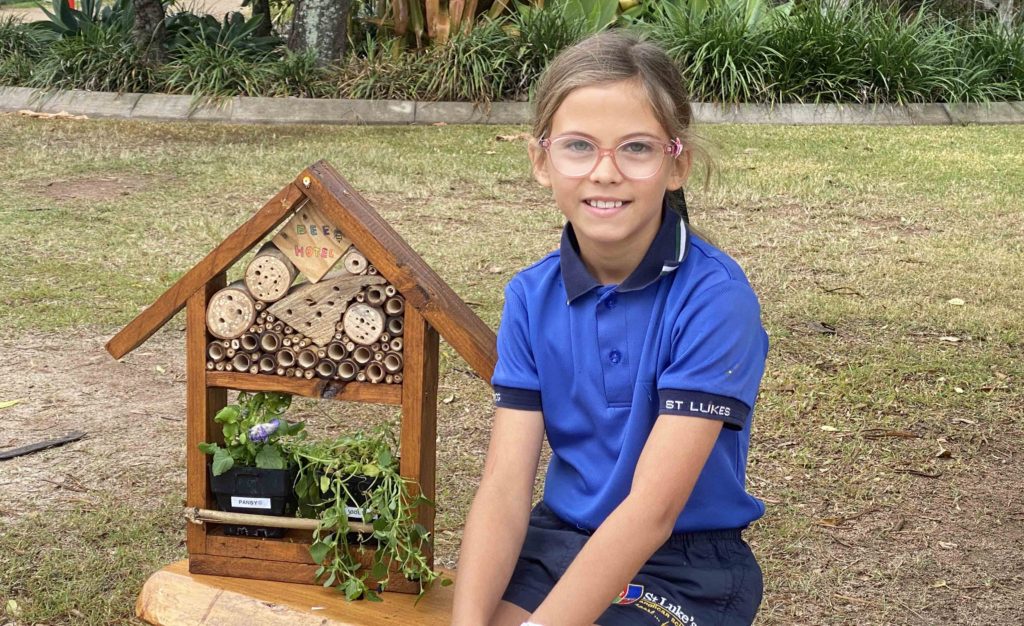
Year 4 St Luke’s Anglican College student Juno with her bee hotel in July 2021
Juno – Year 4 student, St Luke’s Anglican School
I find it interesting how there are around 20,000 different types of bees whereas only a certain amount are honey bees. I am also interested in bees’ roles in the hive. They need to be done right to keep the hive healthy and sustainable.
My favourite school bee activity was the creation of the bee hotel. It was fun because I got to practise my creativity skills and the process of the creation was a little hard, but the product was still quite nice.
Bees are important as they play a big role in ecosystems. They pollinate flowers, which is really important. Without them we would lose some of our precious plants and a significant amount of our fruits, vegetables and nuts. Pollinating is a hard job so we should respect bees and keep them alive.
I highly recommend that other schools should learn about, and participate in, saving the bees. Building a bee hive is one of the many ways to keep bees alive. Not only do you help save the bees but you also learn that bees are fascinating features. If you think you know all about bees there’s still more facts out there.
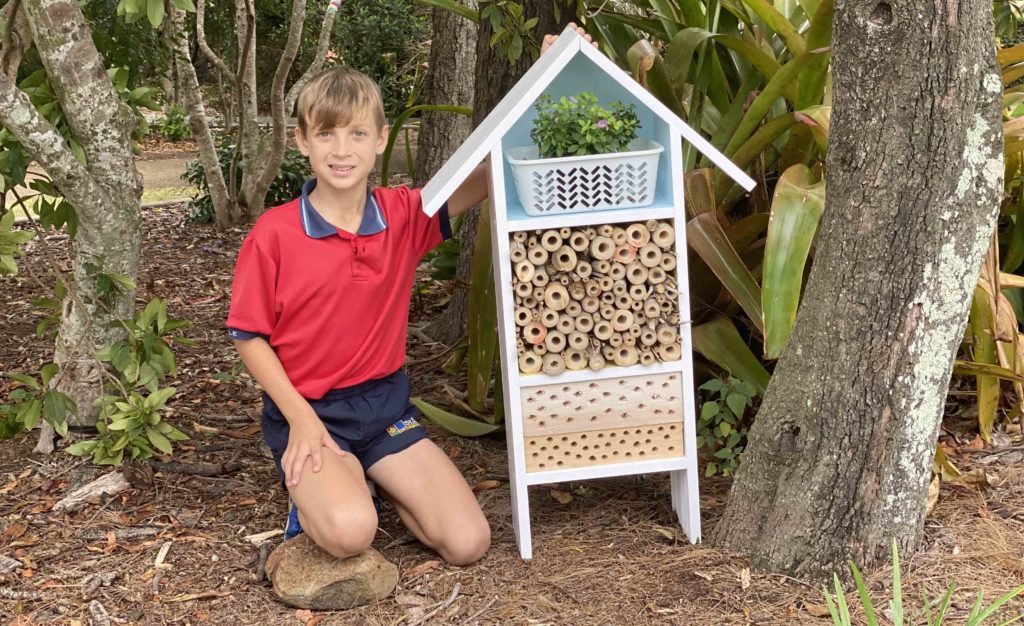
Year 4 St Luke’s Anglican College student Parker with his bee hotel in July 2021
Parker – Year 4 student, St Luke’s Anglican School
The most interesting thing that I learnt is that food production relies heavily on bees. I also enjoyed learning about the bee life cycle and what the duties are of the Queen, drone and worker bees.
My favorite activity was planning and creating the bee hotel. I really enjoyed the process where I got to spend time with my mum and dad at home helping to build my bee hive. We used a design planning sheet where we had to draw a blueprint for the bee hotels, and then go home and build it.
Bees are important because most of our groceries stores rely on bees and without the bees our grocery markets will pretty much be empty. Which means that there won’t be enough food to feed all of the families.
I think it is a good idea for other schools to study bees so we can all make bee hotels to help the environment to help the survival of bees.
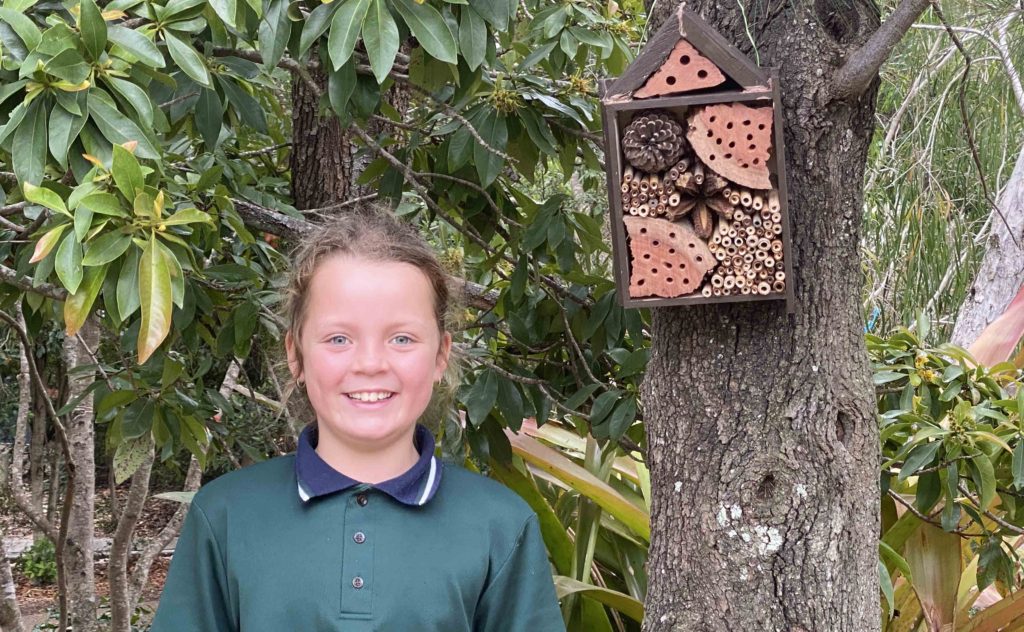
Year 4 St Luke’s Anglican College student Samantha with her bee hotel in July 2021
Samantha – Year 4 student, St Luke’s Anglican School
The most interesting and surprising thing I have learnt about bees this term is that after the Summer when no more babies are needed in the hive, worker bees (who really live up to their name by completing the gazillion jobs within the hive) push the drone bees out of the hive where they eventually die and turn into hummus.
I really enjoyed all of the bee activities that we completed, but my favourite would have to be the Bee Bandits activity. It was a really fun math activity where we had to figure out who abducted our beautiful bees. We had to decode a series of math clues that put our math knowledge to the test! We finally discovered who the big, bad and bold culprits were; they turned out to be the Hangry Hobgoblins.
Related Story
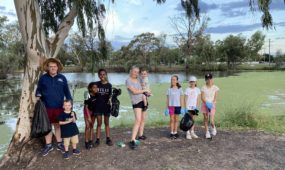 Features
Features
Dalby Anglicans clear the weir
Bees are important because, although not purposely, they are pollinators. Pollination is the process of bees accidentally spreading pollen from flower to flower and plant to plant, which helps to fertilise and grow our crops. Did you know that if bees were to become extinct, humankind would have less than four years left to live? These tiny critters may be small, but they play an enormous role in our world.
I would really recommend other schools studying bees and bee hotels because it genuinely teaches you to think outside the box. It also forces you to work with the materials that you already have, even though sometimes it’s not exactly what you want. It teaches you to be more flexible and resilient. Native bee hotels are a great way to learn about bees, a way that differs from others and a way that might perhaps be more fun!
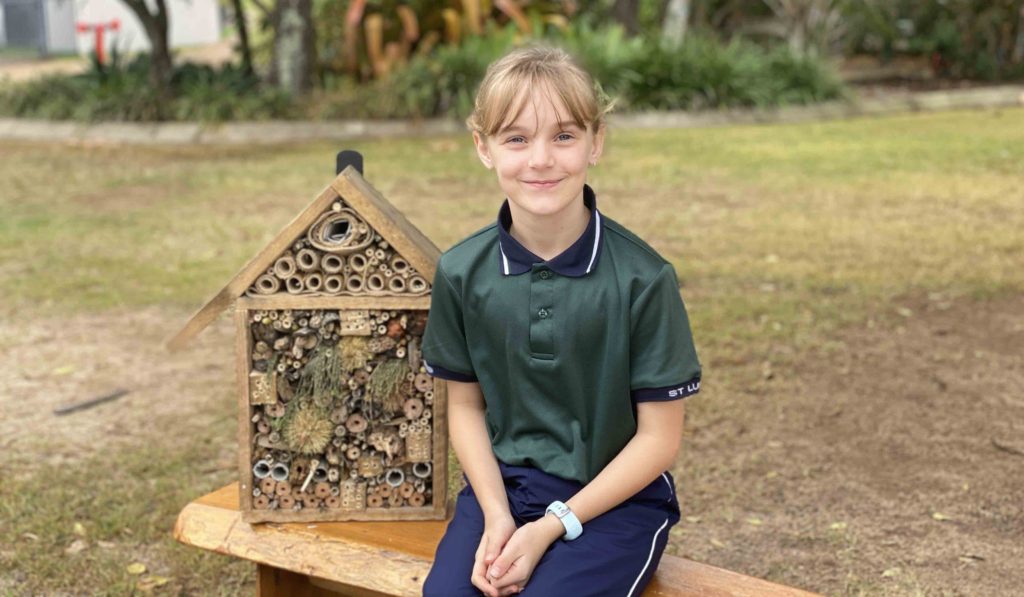
Year 4 St Luke’s Anglican College student Caitlyn with her bee hotel in July 2021
Caitlyn – Year 4 student, St Luke’s Anglican School
What I find interesting about bees is that there is one drone for every worker and they help produce one third of our food.
I enjoyed doing the bee hotel because it makes us feel like we are helping the bees survive so there can be a world to live in, which is good for everyone and everything.
Bees are very important because they pollinate plants, which feed animals. Without bees, animals would start dying and then lead to us dying.
I recommend that other schools make bees hives so that they can understand how bees are helping the world stay alive.
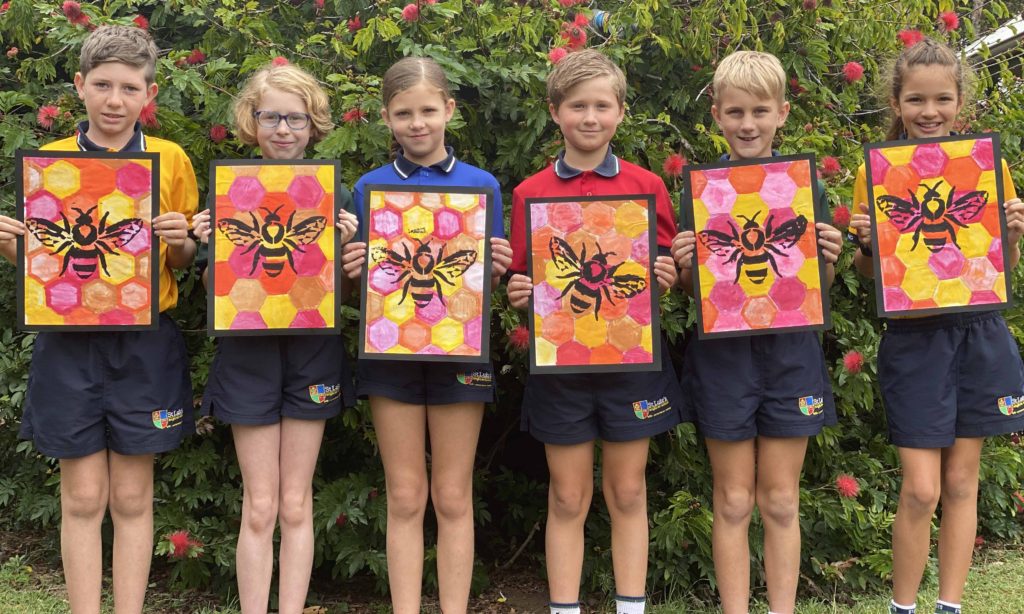
Year 4 St Luke’s Anglican School students engaged in a number of bee-related activities this year, including (left to right) Hudson, Georgie, Sage, Ashton, Thomas and Amelie





